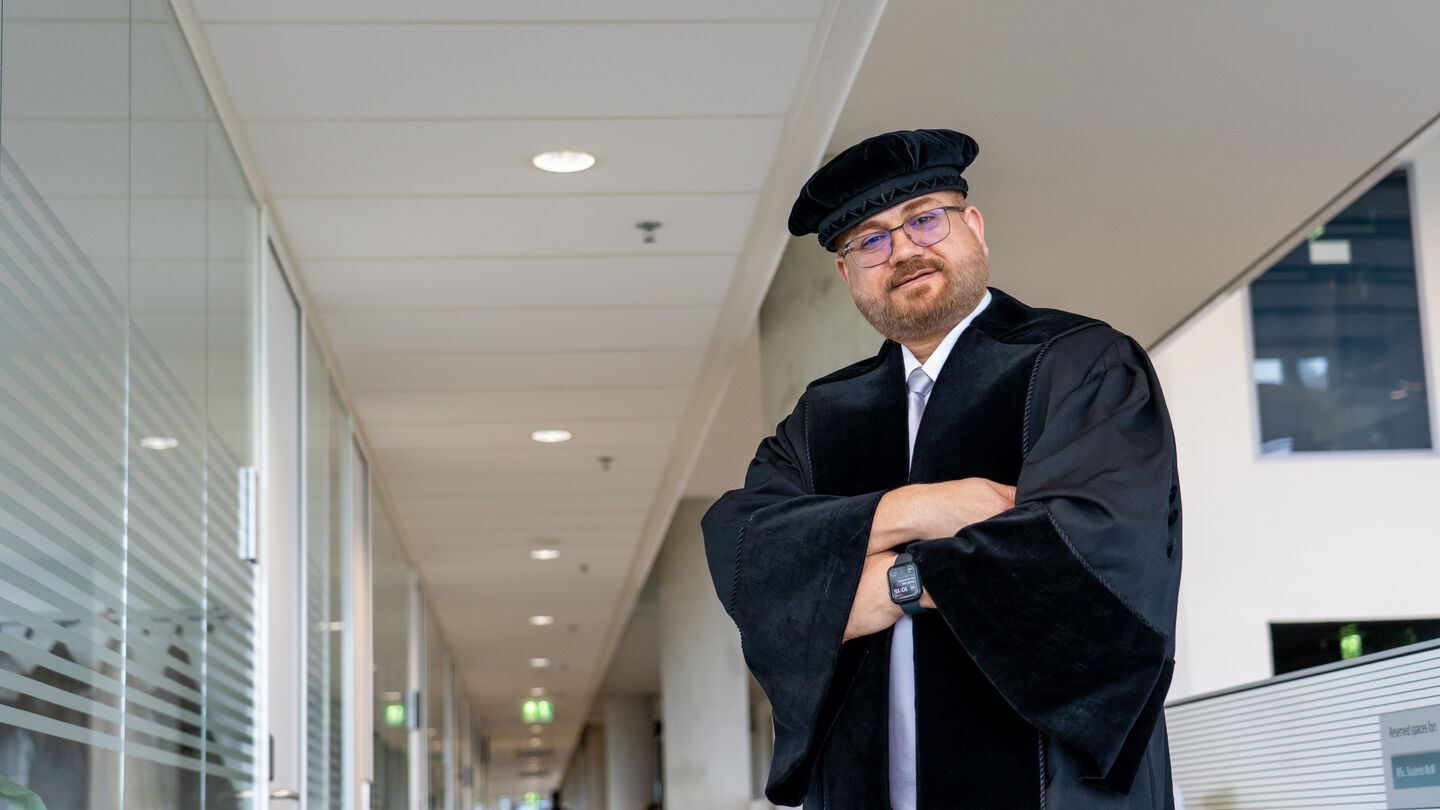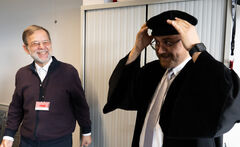
Shihab Al-Daffaie can now wear an academic gown at MomenTUm
He is not a full professor yet, but Shihab Al-Daffaie will still be walking in the cortège at MomenTUm—in academic gown. This is possible thanks to the “everyone professor” policy the university introduced almost a year ago. He is the only one making use of this new right at the celebration this year.
Technically, Al-Daffaie was already a professor when he came to TU/e from Germany as a guest. “In Germany, there is a different system in which you are immediately called a professor,” he explains. When he made the actual move to Eindhoven, however, he automatically fell under the Dutch system and ‘lost’ his title: he became an assistant professor. “That was a weird feeling,” Al-Daffaie recalls.
It felt even stranger when he attended his first PhD defense in the Netherlands. “Almost everyone around me was wearing a gown. Everything looked very official. And then there’s this man with a staff who walks in (the beadle, ed.). I thought: where have I ended up? In Germany, everyone just wears a suit.” He also noticed something else: one of his colleagues wasn’t wearing a gown. “He wasn’t allowed to, because he wasn’t a full professor.”
Recognition
That experience made wearing a gown into a goal for Al-Daffaie. “As a symbol of what you’ve achieved.” Being allowed to wear the robe now, and to call himself professor, doesn’t change his core ambition: to be promoted and eventually become a full professor. He sees the gown and title more as recognition for the work he is already doing—work that is far from minor.
For Al-Daffaie, the fact that assistant and associate professors can now also obtain ius promovendi—the right to supervise PhD students as the first promoter—may be even more important than the recognition that comes with the gown. He is still in the process of obtaining this right but is already supervising four PhD candidates, with a fifth on the way. In his view, it is precisely assistant and associate professors who do most of the supervision work, and they deserve the right to hand over the degree and give the accompanying speech. “That task shouldn’t fall to someone who may have only met my PhD candidate twice.”
Hesitant
Al-Daffaie hopes more of his colleagues will embrace their new title. For now, he notices that many of them remain hesitant. “They think it doesn’t apply to them, or they don’t believe it’s real.” MomenTUm, he believes, is the perfect occasion to show that it is indeed real and that they have just as much right to walk in the cortège as full professors.
Arranging a gown for the occasion was not difficult for Al-Daffaie. For now, he is the only non-full professor joining the cortège. The university has twenty gowns available for loan, and when Al-Daffaie told his colleagues about MomenTUm, he was spontaneously offered two more.
One of those offers came from Peter Baltus, who shares an office with Al-Daffaie and keeps his gown hanging on the coat rack there. Baltus points out the distinctive details of a TU/e gown: “There should be five buttons along the side. The gown maker accidentally only put on three. I actually got told off by the beadle for that.”
Wearing the gown properly is a serious matter, also Al-Daffaie knows. His matching silver TU/e tie and white shirt are already laid out. Bring on the cortège.
Room for improvement
Al-Daffaie is pleased with the “everyone professor” policy but believes the title should then be used consistently. He sees that colleagues don’t always do so, and even on the TU/e website, only “dr.” is listed next to his name, not “prof. dr.” The reason for this, explains Julma Braat, policy advisor for Recognition and Rewards at Human Resources Management, is that TU/e continues to adhere to the official Dutch system of titles.
“The address title professor is meant to give recognition and highlight people’s expertise, but at the university, we still distinguish between the different positions (assistant/associate professors and full professors, ed.), each with their different tasks. In the PhD committee and on the thesis, the official titles are also used. That is why it made sense for the university to keep them”, she says. Al-Daffaie doesn’t see the sense in it and is still hoping that the university will take a second look from a different perspective.
This article was translated using AI-assisted tools and reviewed by an editor.


Discussion